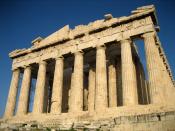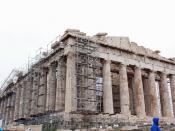Athens, Greece
Athens Greece is considered the birthplace of western civilization. The site has been inhibited for over 5000 years. It is one of the first cities to display some form of urban planning structure. The city was built in central Greece which has an geographical environment that includes It is a collection of religious temples, theatres, political and market buildings. Even in modern day many of these structures have survived and been preserved to become one of the largest tourist attractions in the world. This paper will examine the history of this great city, look at some of the main structures that were constructed over its long history.
Athens , like most Greek cities originated as a coalescence of separate villages to form a powerful state. The formation of villages to form a city-state called a "Polis" was common in Greece. A Polis usually was a small, agriculture in origin, community with a central place or "city" enjoying a political independence and a strong separate identity.
These separate states in Greece were never considered a nation because all of them were constantly in conflict. This is why a powerfully state was needed to survive. The city of Athens' central place included the Acropolis, Agora, a wall, Religious temples, Theatres, public baths, Stadiums and the Olympieion. Archeological finds show that Athens originated before the 3rd century before BC when the fortress was build on the acropolis. Soon to follow was a wall around the hill and the Agora in the Bronze age (1200 BC). Athens was one of the few cities to survive the late bronze age and early iron age troubled times. Reasons for this include the geographical position, its strength in its walls or the fighting spirit in the people. "The city grew about these generative element, so...



Thanx
Dude, thanx a lot. I'm doing a project about Tourism in Athens, and your info helped me out a lot and I mean a lot!
Keep up the good work!
2 out of 2 people found this comment useful.